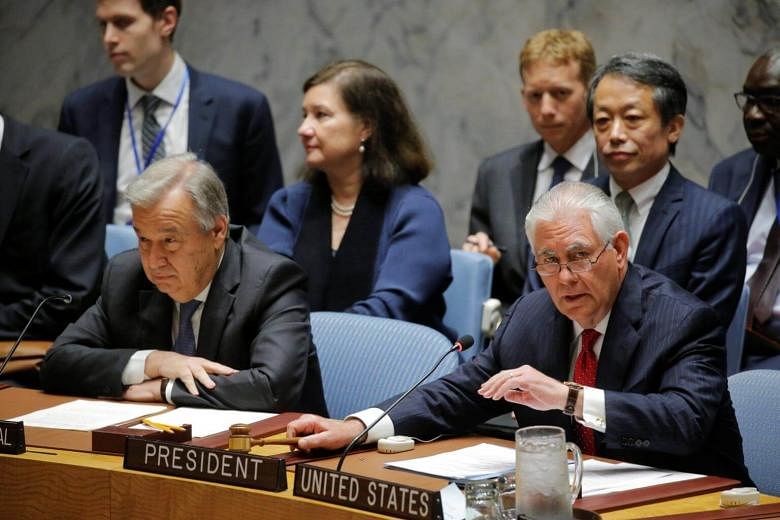UNITED NATIONS, United States - Calling for the international community to isolate North Korea, US Secretary of state Rex Tillerson warned the UN Security Council (UNSC) at a Ministerial Session in New York on Friday (April 28) that: "Business as usual is not an option."
"For the past 20 years, well-intentioned diplomatic efforts to halt (North Korea's nuclear and missile programmes) have failed" he said.
"It is only by first dismantling them that there can be peace, stability, and economic prosperity for all of North-east Asia.
"The threat of a North Korean nuclear attack on Seoul, or Tokyo, is real. And it is likely only a matter of time before North Korea develops the capability to strike the US mainland. Indeed, the DPRK has repeatedly claimed it plans to conduct such a strike."
"Given that rhetoric, the United States cannot idly stand by. Nor can other members of this council who are within striking distance of North Korean missiles.
"We will not negotiate our way back to the negotiating table with North Korea" he insisted.
"We will not reward their violations of past (UNSC) resolutions (or) their bad behaviour with talks. We will only engage in talks with North Korea if they exhibit a good faith commitment to abide by Security Council resolutions."
The Security Council has passed numerous resolutions mandating sanctions against North Korea to pressure it to curb its nuclear and missile programmes, most recently in March and November 2016,and in March 2017 when sanctions were tightened.
"We have called for sanctions to be extended and are calling globally for all countries to participate in exerting pressure on North Korea" Mr Tillerson said.
In remarks aimed at China, he emphasised "We must have full, complete compliance by all members of the Council."
Some 90 per cent of the DPRK's trade is with China, but the US sees China as not having exerted enough pressure on Pyongyang. The North Korean regime has since 2008 conducted four nuclear tests and dozens of missile tests.
China's foreign minister Wang Yi said "China is not the focal point, the key does not lie in the hands of China.
"China has already made unremitting efforts and played a unique role in promoting a negotiated solution... through talks. China is still prepared to work with all parties to make new contributions to the resolution of the nuclear issue on the peninsula."
He warned : "We must stay committed to the path of dialogue and negotiation. Use of force does not solve differences and will only lead to greater disasters."
"In case of unexpected events, the situation (on the Korean peninsula) is highly likely to take a drastic turn for the worse and spiral out of control and there is no lack of such painful lessons in history.
"The most urgent task now is to stop... the DPRK's nuclear and missile development. It is necessary to put aside the debate over who should take the first step. We should lower flash points. The state of affairs on the peninsula is not caused by any single party."
"Our goal is not regime change nor do we desire to threaten the North Korean people," Mr Tillerson told the meeting.
But he added: "We must increase North Korea's financial isolation. We will not hesitate to sanction third countries and individuals supporting the Democratic Republic of Korea's (DPRK's) activities.
"We must all do our share but China alone has economic leverage over Pyongyang that is unique and its role is therefore particularly important."
Mr Tillerson reiterated that "all options for responding to future provocation must remain on the table" including willingness to "counter North Korean aggression with military action if necessary."
Speaking to The Straits Times by phone, Dr Michael D. Swain, a senior fellow at the Carnegie Endowment for International Peace, said: "Sanctions, if they are really across the board, will hurt more, but I am not confident they will actually force the North Koreans to change course.
"The Trump administration seems to think the Chinese will do their utmost. The question is how far the Chinese go, and how effective these full court sanctions will be.
"I doubt very much that the North Koreans will give up testing at all permanently; some time in the future, they will probably test again regardless of the sanctions, and then the question becomes what then.
"We don't know what the Trump administration's plans are in that event."


